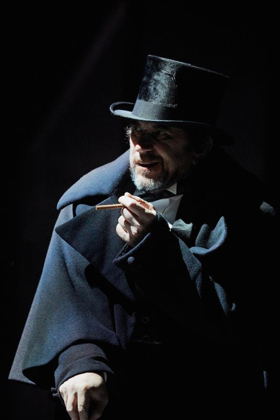Review: DR JEKYLL & MR HYDE, Rose Theatre

![]() Robert Louis Stevenson's gothic thriller has had such an impact on the public psyche that a reference to 'Jekyll and Hyde' is universally known as referring to a person with a dual personality. An adaptation at Kingston's Rose Theatre attempts to convey the dark horror of the story where upright Dr Jekyll's secret experiments split his personality in two and reveal the murderous Mr Hyde. Unfortunately, the shocking impact of the story is lost in this overly long and un-engaging adaptation.
Robert Louis Stevenson's gothic thriller has had such an impact on the public psyche that a reference to 'Jekyll and Hyde' is universally known as referring to a person with a dual personality. An adaptation at Kingston's Rose Theatre attempts to convey the dark horror of the story where upright Dr Jekyll's secret experiments split his personality in two and reveal the murderous Mr Hyde. Unfortunately, the shocking impact of the story is lost in this overly long and un-engaging adaptation.
The core of the play should be the interplay between good and evil and the duality of human nature. However, David Edgar's adaptation meanders and wanders for two and half hours, when a sharp and snappy one act play would have served the story far better. Edgar's version also adds female characters to an all-male story. In theory this lends balance and interest to the play; Jekyll's sister Katherine is there to add a warm, familial background to Jekyll's character, but the scenes at her home in Devon are directionless and lack purpose. The first half hour of the play is completely superfluous.
The addition of maid Annie is more successful as a bridge between Jekyll's family in the country and his London life. She is a more interesting character, with a sad backstory and a curious mind. What is uncomfortably obvious is that the majority of the violence in the production is directed towards the female characters. Except the singer, who is not essentially a character, all women are exposed to high levels of violence and abuse. Katherine has lost an eye in an attack, her daughter Lucy is visibly terrified by her uncle, Annie is branded by her father and later beaten by Hyde. Hyde's rape of Annie seems particularly gratuitous and is unnecessary in conveying the evil aspects of Hyde. In today's climate, such additions are ill-judged, if they add nothing concrete to the story.
In the book, Jekyll asserts that "man is not truly one, but truly two". The challenge for Phil Daniels as both Jekyll and Hyde is to portray absolutely distinct and different characters. His staid Jekyll is so anodyne that you are desperate for his transformation into the devilish Hyde. The character of Hyde should be almost animalistic, with the veneer of civilisation stripped away, but Daniels fails to inject all the necessary demonic and shocking aspects of the character. His extreme Scottish accent, sneering face and crouching body is a stark contrast to the upright and uptight Jekyll, but is just not frightening enough. At times, it is almost as though he is playing the role for laughs.
Sam Cox is a well-measured and formal presence as butler Poole, who adds a little levity with several snarky asides. Grace Hogg-Robinson is very convincing as maid Annie, with a sharp eye and good levels of emotional intelligence.
Simon Higlett's set and costume design is faithful to Louis Stevenson's writing and is evocative of the landscape of Victorian London. Dark, foggy streets lit eerily by gas and candlelight form a sinister landscape, with a clever use of two stories where characters can observe the action below. Darkness is everywhere and even the walls inside the house are painted black, with the exception of the forboding red door to Hyde's laboratory. Richard Hammerton's sound design is nicely eerie, with the judicious addition of haunting songs and melodies sung with great clarity and poise by Rosie Abraham. There is also a well-judged use of sound effects, with deliciously gruesome cracking of bones as Hyde kills politician Carew.
It is a shame that the high levels set by the look and sound of the production are undermined by the slow and meandering story.
Dr Jekyll & Mr Hyde is at the Rose Theatre until 17 February, then touring
Photo Credit: Marc Douet
Reader Reviews

Videos

